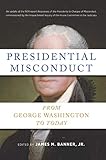Presidential misconduct : from George Washington to today / edited by James M. Banner, Jr..
Contributor(s): Banner, James M., Jr [editor.] | United States. Congress. House. Committee on the Judiciary [sponsoring body.]
Language: English Publisher: New York ; London : The New Press 2019Copyright date: © 2019 by The New PressDescription: 1 online resourceContent type: text Media type: computer Carrier type: online resourceISBN: 9781620975497Uniform titles: Responses of the presidents to charges of misconduct Subject(s): Political corruption -- United States -- History | Misconduct in office -- United States -- History | Presidents -- United States -- HistoryGenre/Form: Electronic books.DDC classification: 973.09/9 LOC classification: JK2249 | .R47 2019Online resources: Full text available at Ebscohost Click here to view Summary: Named a best book of the year by The Economist and Foreign Affairs'A whole book devoted exclusively to the misconduct of American presidents and their responses to charges of misconduct is without precedent.'—from the introduction to the 1974 edition by C. Vann Woodward, Pulitzer Prize–winning Yale historianThe historic 1974 report for the House Committee on the Judiciary, updated for today by leading presidential historiansIn May 1974, as President Richard Nixon faced impeachment following the Watergate scandal, the House Judiciary Committee commissioned a historical account of the misdeeds of past presidents. The account, compiled by leading presidential historians of the day, reached back to George Washington's administration and was designed to provide a benchmark against which Nixon's misdeeds could be measured.What the report found was that, with the exception of William Henry Harrison (who served less than a month), every American president has been accused of misconduct: James Buchanan was charged with rigging the election of 1856; Ulysses S. Grant was reprimanded for not firing his corrupt staffer, Orville Babcock, in the'Whiskey Ring'bribery scandal; and Franklin D. Roosevelt's administration faced repeated charges of malfeasance in the Works Progress Administration.Now, as another president and his subordinates face an array of charges on a wide range of legal and constitutional offenses, a group of presidential historians has come together under the leadership of James M. Banner, Jr.—one of the historians who contributed to the original report—to bring the 1974 account up to date through Barack Obama's presidency. Based on current scholarship, this new material covers such well-known episodes as Nixon's Watergate crisis, Reagan's Iran-Contra scandal, Clinton's impeachment, and George W. Bush's connection to the exposure of intelligence secrets. But oft-forgotten events also take the stage: Carter's troubles with advisor Bert Lance, Reagan's savings and loan crisis, George H.W. Bush's nomination of Clarence Thomas to the Supreme Court, and Obama's Solyndra loan controversy.The only comprehensive study of American presidents'misconduct and the ways in which chief executives and members of their official families have responded to the charges brought against them, this new edition is designed to serve the same purpose as the original 1974 report: to provide the historical context and metric against which the actions of the current administration may be assessed. Provided by publisher.| Item type | Current location | Home library | Call number | Status | Date due | Barcode | Item holds |
|---|---|---|---|---|---|---|---|
 EBOOK
EBOOK
|
COLLEGE LIBRARY | COLLEGE LIBRARY | 973.09/9 (Browse shelf) | Available |
"Distributed by Two Rivers Distribution"--T.p. verso.
"The introduction by C. Vann Woodward and the chapters from George Washington through Lyndon B. Johnson were originally published in the United States as Responses of the Presidents to Charges of Misconduct by Dell Publishing Co., Inc., New York, 1974"--Title page verso.
Includes bibliographical references.
Named a best book of the year by The Economist and Foreign Affairs'A whole book devoted exclusively to the misconduct of American presidents and their responses to charges of misconduct is without precedent.'—from the introduction to the 1974 edition by C. Vann Woodward, Pulitzer Prize–winning Yale historianThe historic 1974 report for the House Committee on the Judiciary, updated for today by leading presidential historiansIn May 1974, as President Richard Nixon faced impeachment following the Watergate scandal, the House Judiciary Committee commissioned a historical account of the misdeeds of past presidents. The account, compiled by leading presidential historians of the day, reached back to George Washington's administration and was designed to provide a benchmark against which Nixon's misdeeds could be measured.What the report found was that, with the exception of William Henry Harrison (who served less than a month), every American president has been accused of misconduct: James Buchanan was charged with rigging the election of 1856; Ulysses S. Grant was reprimanded for not firing his corrupt staffer, Orville Babcock, in the'Whiskey Ring'bribery scandal; and Franklin D. Roosevelt's administration faced repeated charges of malfeasance in the Works Progress Administration.Now, as another president and his subordinates face an array of charges on a wide range of legal and constitutional offenses, a group of presidential historians has come together under the leadership of James M. Banner, Jr.—one of the historians who contributed to the original report—to bring the 1974 account up to date through Barack Obama's presidency. Based on current scholarship, this new material covers such well-known episodes as Nixon's Watergate crisis, Reagan's Iran-Contra scandal, Clinton's impeachment, and George W. Bush's connection to the exposure of intelligence secrets. But oft-forgotten events also take the stage: Carter's troubles with advisor Bert Lance, Reagan's savings and loan crisis, George H.W. Bush's nomination of Clarence Thomas to the Supreme Court, and Obama's Solyndra loan controversy.The only comprehensive study of American presidents'misconduct and the ways in which chief executives and members of their official families have responded to the charges brought against them, this new edition is designed to serve the same purpose as the original 1974 report: to provide the historical context and metric against which the actions of the current administration may be assessed. Provided by publisher.

There are no comments for this item.